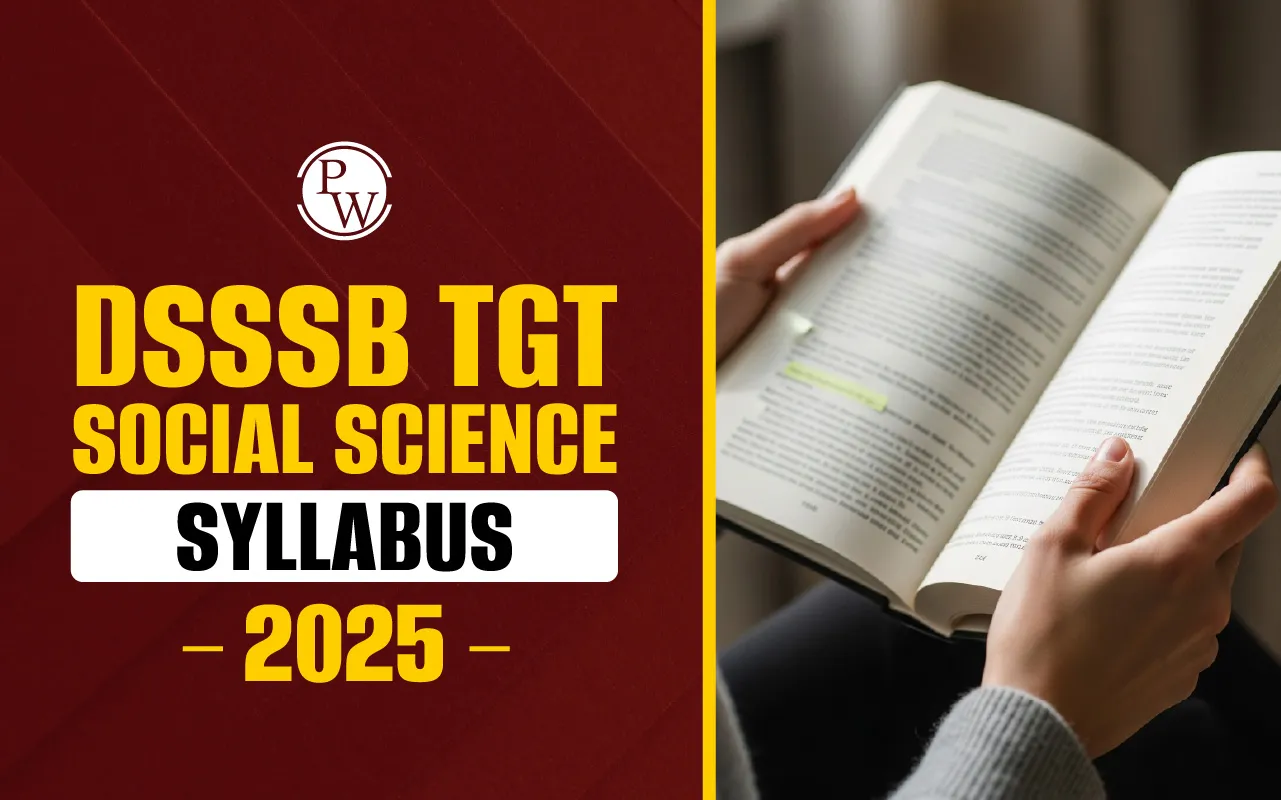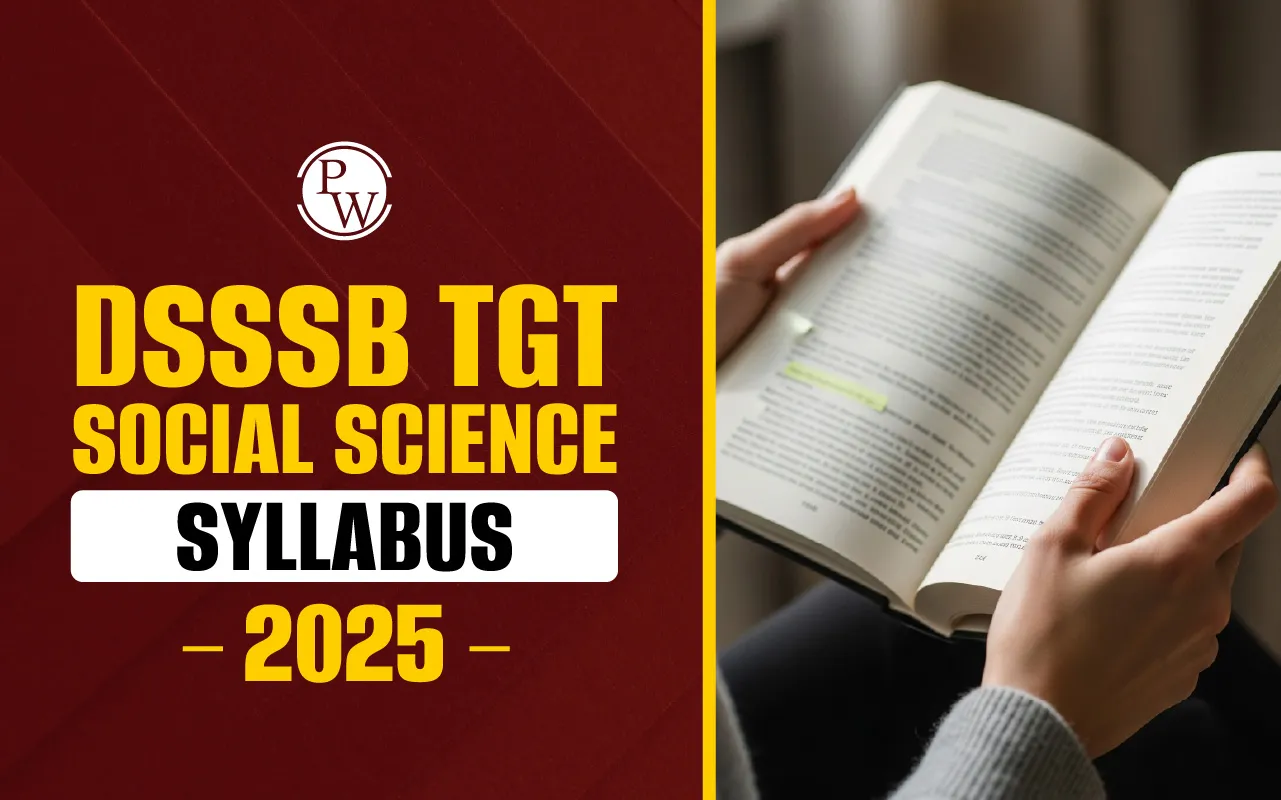

DSSSB TGT Social Science Syllabus 2025 is an important document for aspirants preparing to appear for the DSSSB Trained Graduate Teacher (TGT) Social Science examination. The Syllabus contains details related to the scope of study across four core subjects: History, Geography, Economics, and Civics.
Preparing without reviewing the official DSSSB TGT Social Science Syllabus 2025 is like studying without direction. Candidates must thoroughly understand the topics, weightage, and subject-specific details to create an effective and focused preparation strategy.
DSSSB TGT Social Science Syllabus PDF
Candidates should thoroughly go through the TGT Social Science syllabus PDF. Having the PDF version is important for offline study and for marking important topics to progress with exam preparation.
| DSSSB TGT Social Science Syllabus PDF | |
| Official Syllabus PDF | Download Here |
DSSSB TGT Social Science Syllabus Topics
Social Science syllabus is strategically designed to test a candidate's knowledge of interdisciplinary topics that are relevant to teaching students at the TGT level. Understanding the structure is vital before diving into the detailed topics. The TGT Social Science subject-wise syllabus covers a wide range of topics, from physical geography to economic policies. The table below provides a quick overview of the key focus areas within each of the four main subjects.
| DSSSB TGT Social Science Syllabus Topics | |
| Subjects | Focus Areas |
| History | Contemporary World History (Revolutions, Wars) and Indian Freedom Struggle |
| Geography | Earth Science, Climatology, Oceanography, and Indian Geography (Location, Resources) |
| Economics | Basic Concepts (Poverty, Sectors, Development) and Indian Economic Features (PPP, Food Security) |
| Civics (Political Science) | Democracy, Federalism, the Indian Constitution, and the Working of Institutions |
DSSSB TGT Social Science Syllabus Subject Wise
A thorough analysis of the DSSSB TGT Syllabus 2025 is important to score well in the exam. The breakdown provided below presents the topics listed in the official notification. Candidates are advised to cover every DSSSB TGT Social Science Syllabus topics:
TGT Social Science History Syllabus
The History section primarily focuses on global events and the struggle for Indian independence. The section requires a good understanding of both pre- and post-1857 historical developments.
-
Contemporary World: Industrial Revolution, Economic Depression, Labour & Peasant Class issues, Growth of industries in India in the twentieth century.
-
Colonial Society in India: Features of colonial society in India.
-
French Revolution: Causes, Events, Impact, and Consequences.
-
The Revolt of 1857: Causes, Events, and Significance.
-
Indian Freedom Struggle: From 1885 to 1947.
-
Russian Revolution: 1917, Causes, Events, Impact on Russia and the World, Consequences.
-
Socialism: Rise of Socialism, Philosophy of Karl Marx, Socialism in Europe, Impact of Socialism.
-
Rise of Fascist Forces: In Germany & Italy.
-
World Events: The Two World Wars and the establishment of the UN.
TGT Social Science Geography Syllabus
The Geography section covers Physical Geography and its application to the Indian context. Topics include the Earth's interior to population studies and disaster management.
-
Earth Studies: Introduction to the solar system, origin of Earth, Motions of the Earth (Rotation, Revolution, Seasons), Latitudes and Longitudes, Earth's Interior, Plate Tectonics, Earthquakes and Volcanoes.
-
Geomorphology: Rocks and minerals (types, soil formation), Agents of gradation (Weathering, running water, wind, glaciers).
-
Climatology: Atmosphere composition and structure, Insulation, Heat Budget, Temperature factors, Pressure belts, Winds, Cyclones, Evaporation, Precipitation, World climates, Climate change, Global warming.
-
Oceanography: Distribution of water bodies, hydrological cycle, Ocean relief, Temperature and Salinity, Movement of ocean waters (waves, tides, currents).
-
Mapping: Maps and Scales, Finding directions, Conventional signs, Techniques of representing relief features (contours, hachures).
-
Biosphere: Ecology, Eco-System (structure and functions), Food Chain, World Biomes, Biodiversity and its conservation.
-
India: Size and Location, Physical features, Geological Structure, Physiographic divisions, drainage system, Climate (Monsoon, Seasons, Classification), Soil, Natural Vegetation.
-
Human Geography: Population (Growth, Distribution, Migration, Theories), Population as a resource, Sustainable development.
-
Economic Geography: Resources and Development, Conservation of water, Minerals, Forests, energy, Major crops, and wildlife.
-
Industry & Economy: Manufacturing Industries (Classification, Locational factors, clusters), Lifelines of National Economy (Transportation, Communication), International trade.
-
Disaster Management: Types of Disasters (Natural & Manmade), Disaster Management components, Risk reduction, Mitigation, Tsunami, Survival skills.
TGT Social Science Economics Syllabus
The Economics section focuses on fundamental economic concepts and issues relevant to India. Candidates should focus on growth, development, poverty, and financial systems.
-
Basic Concepts: Components of production, People as Resource, Economic/Non-economic activities.
-
Poverty: Poverty as a challenge, Poverty line, Poverty & inequality, Policies for poverty reduction, Poverty estimates.
-
Food Security: Food Security in India, Green revolution, Buffer Stock, Issue Price/Support Price, Role of co-operative societies in food security.
-
Development: Growth/Development and structural development, Sustainable agricultural growth, Purchasing power parity (PPP), Foreign trade & Economic development.
-
Indian Economy: Main features of the Indian Economy at the time of Independence, Sectors of the Economy (Primary/Secondary/Organised/Unorganised/Public/Private).
-
Finance & Banking: Money & Credit, Indian Monetary System, Function of money, Banks (Central Bank, Commercial Banks), Self-help Groups (SHGs), Debt trap.
TGT Social Science Civics (Political Science) Syllabus
The Civics section covers the working of democratic institutions and the Indian Constitution. A clear understanding of foundational democratic principles is important.
-
Political Systems: Power sharing, Federalism, Democracy and Diversity, Political parties, Elections.
-
Democracy: Concept, Salient Features, Local Self Government, Democracy in India & the World, Challenges to Democracy, Popular struggle and movements (like in Nepal, Bolivia).
-
Indian Constitution: Framing of the Constitution, Adoption of the Constitution.
-
Governance: Working of Institutions (Parliament), Fundamental Rights, Judiciary.
Importance of DSSSB TGT Social Science Syllabus 2025
Successful preparation starts with a strategy built around the official curriculum. The TGT Social Science official syllabus is a blueprint for exam preparation.
-
Candidates should first cross-reference their study material with every topic in the TGT Social Science subject-wise syllabus. This ensures you do not waste time on irrelevant chapters.
-
Focusing on high-weightage areas, especially in History (Revolutions) and Geography (Indian Physical Features), will ensure maximum return on investment of your study time.
-
Make a time-bound study schedule, allocate hours based on the weightage and your proficiency in each subject, and incorporate daily revision using the downloaded TGT Social Science syllabus PDF as your checklist.
